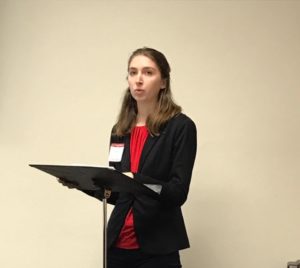 As I am preparing for my third, and final, Appalachian Studies Association Conference of my college career, I feel reflective about the previous two years of experience I have had at the annual ASA conference. For me, ASA has been a time for connection, a time for confidence, a time to share ideas and receive valuable feedback.
As I am preparing for my third, and final, Appalachian Studies Association Conference of my college career, I feel reflective about the previous two years of experience I have had at the annual ASA conference. For me, ASA has been a time for connection, a time for confidence, a time to share ideas and receive valuable feedback.
My first year attending the annual ASA conference in 2017, I had no idea what to expect and was excited in the terrifying way pretty much everyone feels about their first time presenting at a conference. The conference, held that year in Blacksburg, VA, was my first time presenting to people with far more academic knowledge and experience than I had as a meager second year college student. I remember walking from the parking garage what seemed like miles across the brutally cold campus, the wind whipping my nose to numbness and my emotional fortitude to zero. Hours later, though, when I was getting ready to present, nothing could have stopped me from sweating, my nerves overriding the winter chill. I need not have worried, however, because people were there to see me to succeed, to cheer me on, to ask me questions about my academic interests, and to prod me in new directions.
The next year, instead of turning into a ball of nerves at the prospect of presenting in Cincinnati, OH, I felt my excitement growing. At the conference in 2018, I presented on a topic close to my heart, one that I wanted everyone to hear, one that I felt passionate about and more fully prepared to share. I was presenting on the original Highlander Folk School now known as the Highlander Research and Education Center in New Market, Tennessee. However, the original Highlander Folk School founded by Myles Horton was just minutes down the road from my house in Monteagle, Tennessee, and was a fixture shrouded in mystery that I never fully delved into until a college research paper.
When fifty people showed up to the panel I did alongside two of my friends, my heart soared. Our excitement translated to the crowd, and I left that day feeling exuberant about the experience. People were interested in hearing about the history of labor education and interracial education at Highlander and how the original folk school is remembered today in Monteagle. At the conference, I ran into people from the previous year and started to realize that the people attending the conference were people who cared about the same things I did, who felt passionate about sharing knowledge about the region we call home. I was learning from other presenters the same way I hoped people were learning from my work.
This year, as I prepare for the annual conference in Asheville, NC, I feel once again excited to return to a community of shared knowledge. ASA is a place to inspire and sustain interest in issues near and dear to my heart, to ask questions, have conversations, and to share ideas. Although this will be my last year attending the conference as a college student, I do not feel sad because I know this ASA will not be my last. I will return again and again to a community who makes me feel valued and who is welcoming to every new presenter, every new attendee, everyone who cares about the Appalachian region and the people who call that region home.
To learn more about ASA and their upcoming conference visit http://www.appalachianstudies.org/annualconference/
Article Written by Emily Masters